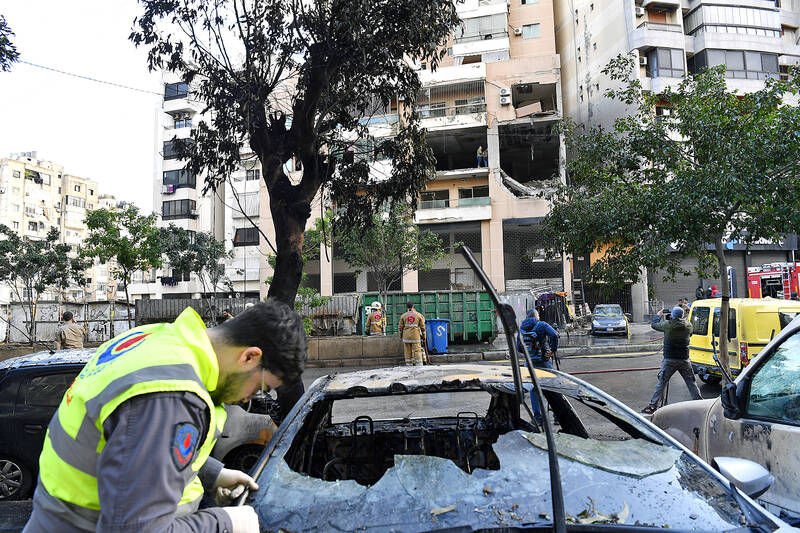Israel yesterday kept bombing Gaza after the army warned it is ready for “any scenario” following a drone strike in Lebanon that killed the deputy leader of the Palestinian militant group Hamas, stoking fears of a regional escalation.
Although Israel did not claim the Beirut assassination on Tuesday evening, it was widely assumed to be behind the killing of Saleh al-Aruri, 57, the political No. 2 of Hamas and one of the founders of the Islamist group’s military wing.
After al-Aruri and six other militants were killed in the attack, Israeli army spokesman Daniel Hagari said the military was in a “very high state of readiness in all arenas” and “highly prepared for any scenario.”

Photo: EPA-EFE
The Israeli armed forces again bombed Gaza targets overnight, including in the crowded southern city of Rafah where eyewitnesses said survivors flocked to Mohammed Yousef al-Najjar Hospital to mourn the dead, including a child.
Israel has vowed to destroy Hamas after the militant group’s bloody Oct. 7 attack and has launched a relentless military campaign in Gaza that has claimed more than 22,000 lives, the territory’s health ministry says.
Israel has labeled Hamas’ Gaza leader Yahya Sinwar a “dead man walking” and vowed to also kill other commanders of the Islamist movement considered a “terrorist” group by the US and the EU.
Amid the nearly three-month-old war, Israel has traded almost daily cross-border fire with the Lebanese armed group Hezbollah, an Iranian-backed ally of Hamas, while so far avoiding a full-scale war.
Maha Yahya, director of the Malcolm H. Kerr Carnegie Middle East Center think tank, said that although al-Aruri’s killing was “a significant escalation,” Hezbollah might not get involved.
“I don’t think Hezbollah will be willing to drag Lebanon into a major conflict at this particular moment and time given the situation regionally,” Yahya said.
Violence has also flared with other militant groups in the Iran-led “Axis of Resistance,” including in Syria, Iraq and Yemen, where Houthi rebels have attacked cargo vessels in the Red Sea, a key shipping lane for world trade.
Iranian Minister of Foreign Affairs Hossein Amir-Abdollahian condemned the “cowardly” Beirut strike and said it proved that Israel “has not achieved any of its goals after weeks of war crimes, genocide and destruction in Gaza and the West Bank of Palestine, despite the direct support of the White House.”
Hezbollah vowed that al-Aruri’s killing would not go unpunished, labeling it “a serious assault on Lebanon ... and a dangerous development.”
Lebanese Prime Minister Najib Mikati charged that the killing “aims to draw Lebanon” deeper into the war, while French President Emmanuel Macron urged Israel to “avoid any escalatory attitude, particularly in Lebanon.”

OPTIMISTIC: The DGBAS sharply upgraded its GDP growth estimate from 3.54 percent to 7.71 percent after the Taiwan-US trade agreement signing and given AI optimism The US imported more from Taiwan than China for the first time in decades, as US President Donald Trump’s tariffs reshape trade flows while a global boom in artificial intelligence (AI) fuels demand for tech products. US purchases of goods from China plunged almost 44 percent in December last year from 2024 to US$21.1 billion, US Department of Commerce data showed on Thursday. By contrast, shipments from Taiwan more than doubled during the same period to US$24.7 billion. The soaring Taiwanese shipments to the US reflect the huge expansion in supplies of chips and servers for AI companies, which has completely changed

The Central Election Commission has amended election and recall regulations to require elected office candidates to provide proof that they have no Chinese citizenship, a Cabinet report said. The commission on Oct. 29 last year revised the Measures for the Permission of Family-based Residence, Long-term Residence and Settlement of People from the Mainland Area in the Taiwan Area (大陸地區人民在台灣地區依親居留長期居留或定居許可辦法), the Executive Yuan said in a report it submitted to the legislature for review. The revision requires Chinese citizens applying for permanent residency to submit notarial documents showing that they have lost their Chinese household record and have renounced — or have never

US and Chinese fighter jets briefly faced off above waters near the Korean Peninsula this week, Yonhap News agency reported, marking a rare confrontation in that area between the two superpowers. About 10 US fighter jets on Wednesday departed an airbase in Pyeongtaek, South Korea, for drills above international waters off South Korea’s western coast, the news outlet cited unidentified military sources as saying. While the US planes did not enter China’s air defense identification zone, Beijing scrambled planes as they neared that region, the report said. “The Chinese People’s Liberation Army organized naval and air forces to monitor and effectively respond

Taiwan has secured another breakthrough in fruit exports, with jujubes, dragon fruit and lychees approved for shipment to the EU, the Ministry of Agriculture said yesterday. The Animal and Plant Health Inspection Agency on Thursday received formal notification of the approval from the EU, the ministry said, adding that the decision was expected to expand Taiwanese fruit producers’ access to high-end European markets. Taiwan exported 126 tonnes of lychees last year, valued at US$1.48 million, with Japan accounting for 102 tonnes. Other export destinations included New Zealand, Hong Kong, the US and Australia, ministry data showed. Jujube exports totaled 103 tonnes, valued at